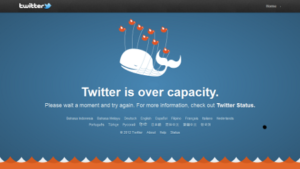By Ted McEnroe, The Community Roundtable
Earlier this month, we got an automated tweet reminding us that The Community Roundtable joined Twitter six years ago. It was a good reminder of how much has changed in social media in that time.
 Six years ago, Twitter was a much more intimate place. In explaining it to people, I often used the “dinner party” analogy – “It’s like a dinner party – you go in and you may only know one person, but you talk to them and meet their friends, and your network begins to grow.” That was before Twitter changed its rules for seeing @ replies, before it became popular enough with brands and others that the noise ratio went up to the point of cacophony. Now, it can feel like a dinner party at a rock concert, only no one is actually watching the band and everyone is talking loudly in all directions. (Facebook, on the other hand, can feel like walking into a dinner party where you recognize everyone but only a few people have paid for the privilege of having vocal chords.)
Six years ago, Twitter was a much more intimate place. In explaining it to people, I often used the “dinner party” analogy – “It’s like a dinner party – you go in and you may only know one person, but you talk to them and meet their friends, and your network begins to grow.” That was before Twitter changed its rules for seeing @ replies, before it became popular enough with brands and others that the noise ratio went up to the point of cacophony. Now, it can feel like a dinner party at a rock concert, only no one is actually watching the band and everyone is talking loudly in all directions. (Facebook, on the other hand, can feel like walking into a dinner party where you recognize everyone but only a few people have paid for the privilege of having vocal chords.)
That’s not to say that Twitter doesn’t have a purpose. But it’s different than it was six years ago. You know what is a lot closer to old Twitter when it comes to connecting with interesting people and making new connections? Communities.
When I look at communities that I am a part of, whether it’s TheCR Network, the nonprofit technology network NTEN, or others – there is still that dinner party feel. I don’t know everyone there, but we share interests, and I know people who know other people – and can build my network that way. It’s where interesting conversations can happen.
As a community manager or a community member, it’s important to understand the difference. And it’s where the balance between content and programming comes into play. Twitter has programming – thousands of tweetchats that bring people together to discuss almost anything – but it can be hard to carry on conversations and is mostly used to push out links and content. It’s best use is as a content network. Conversely, communities can be fine places to post content – but where they thrive is in their programming – creating spaces and events where people can come together and share and debate ideas that matter to them. This is more than content sharing – it’s relationship building. Whether you are working in an external capacity or an internal one, communities have a rare ability to build those intangible connections that bring people together. (And yes, some communities have been doing it brilliantly for years.)
Some ways to do it:
- Play the host. Welcoming people into the community plays a huge role in getting them comfortable enough to engage. It’s the equivalent to taking their coat, welcoming them in and telling them where they can find a drink.
- Create member collisions. Programming provides a specific time and place for people with common interests to gather – effectively acting as a prompt for members to collide, engage and get to know each other.
- Do a little matchmaking. Know two members facing the same issues? Introduce them. Or at least find ways to make sure that when you are offering programming with an appeal to them that they know about it and know you’re paying attention to their needs.
Outreach like this can be heavy lifting. But it sets a tone for the community that you want to get adopted by your members. You also want to think about systems that make spotting and creating these connections easier – from tagging content and member profiles to setting up forums and capturing reports from past events that let new community members see who the experts and leaders are in a particular space.
That has one other impact that reminds me of 2007-2009 Twitter. Back then, conversations held on Twitter led to a driving need for in-person connections – the birth of the “tweetup.” Today, our TheCR Network members crave more of those opportunities. The NTEN crew descends upon the annual Nonprofit Technology Conference as practically a high school reunion. And communities like the Customer Experience Professionals Association have been able to use online community to scale the power of their in-person gatherings in an impressive way.
I still spend a lot of time on Twitter for content and information. I go to Facebook to catch up with friends as best I can. But more and more I am plugged into my Facebook Groups and my communities if I want and need more robust relationships. It’s an opportunity we as community professionals can’t afford to waste.
The Community Roundtable is transitioning its Facebook page to a Facebook Group to supplement TheCR Network and bring back the conversation about community strategy to a wider audience. Join the group at https://www.facebook.com/groups/TheCommunityRoundtable.
